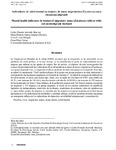
Please use this identifier to cite or link to this item:
http://ricaxcan.uaz.edu.mx/jspui/handle/20.500.11845/308| Title: | Indicadores de salud mental en mujeres de zonas migratorias (Zacatecas) con o sin pareja migrante |
| Other Titles: | Mental health indicators in women of migratory zones (Zacatecas) with or without an immigrant husband |
| Authors: | Pérez Veyna, Oscar Acevedo Sánchez, Carlos Ernesto García Sánchez, María Dolores Luís Delgado, Oliva |
| Issue Date: | 1-Jan-2017 |
| Publisher: | Universidad de Sonora |
| Abstract: | La Organización Mundial de la Salud (OMS) reconoce que la migración se ha convertido en un problema de salud pública; al mismo tiempo, se ha identificado el grado de vulnerabilidad de las mujeres que radican en los puntos de origen. Por tal motivo, el objetivo de esta investigación fue conocer la prevalencia de los indicadores de salud mental en mujeres de zonas migratorias (Zacatecas), con pareja migrante o no, y comprobar el efecto protector de tener una pareja no inmigrante. Para ello, se aplicó el cuestionario “Perfil epidemiológico de la mujer con pareja migrante en zona tradicional y emergente de alta incidencia migratoria en el estado de Zacatecas”. Se utilizó la categoría de indicadores de salud mental, es decir, una escala tipo Likert, con un alpha de Cronbach de 0.897, una validez de 98.3%, una varianza de 118.636 y una desviación estándar de 10.89201 a una muestra de 279 mujeres de los municipios de Jerez y Juan Aldama; de la población mencionada 144 fueron mujeres con pareja no migrante y 135 mujeres con pareja migrante. A través de los análisis estadísticos de prueba de hipótesis, de independencia, intervalos de confianza, estadísticas de contraste, valor de significancia y para ambos grupos de mujeres, se encontró que las mujeres con pareja migrante presentan mayor prevalencia en los indicadores de hostilidad y ansiedad, además, el efecto protector de tener una pareja no inmigrante influye en los indicadores de depresión, sensibilidad interpersonal y somatización. |
| Description: | The World Health Organization (WHO) recognizes that migration has become a public health problem; at the same time has degree the vulnerability of the women in the points of origin. For this reason the objective of this research was to know the prevalence of mental health indicators in women from migratory zones (Zacatecas) with migrant partner or not and to verify the protective effect of having a nonimmigrant partner. For this purpose the questionnaire: epidemiological profile of women with migrant partners in traditional and emergent areas with high migratory incidence in the state of Zacatecas, using the category of mental health indicators which is a Likert scale with an alpha of Cronbach of 0.897, a validity of 98.3%, a variance of 118,636 and a standard deviation of 10.89201 for a sample of 279 women from the municipalities of Jerez and Juan Aldama, of which 144 were women with nonimmigrant partners and 135 women with migrant couple. Trough statistical analyzes of hypothesis testing, independence, confidence intervals, contrast, statistics significance, and the value of r for both groups of women; finding that women with a migrant partner have a higher prevalence in the indicators of hostility and anxiety and the protective effect of having a nonimmigrant partner influences the indicators of depression, interpersonal sensitivity and somatization. |
| URI: | http://hdl.handle.net/20.500.11845/308 https://doi.org/10.48779/grdc-0c36 |
| ISSN: | 2007-5936 |
| Other Identifiers: | info:eu-repo/semantics/publishedVersion |
| Appears in Collections: | *Documentos Académicos*-- UA Estudios del Desarrollo |
Files in This Item:
| File | Description | Size | Format | |
|---|---|---|---|---|
| Indicadores de salud mental en mujeres, Acevedo et al.pdf | Artículo principal | 333,05 kB | Adobe PDF |  View/Open |
This item is licensed under a Creative Commons License
